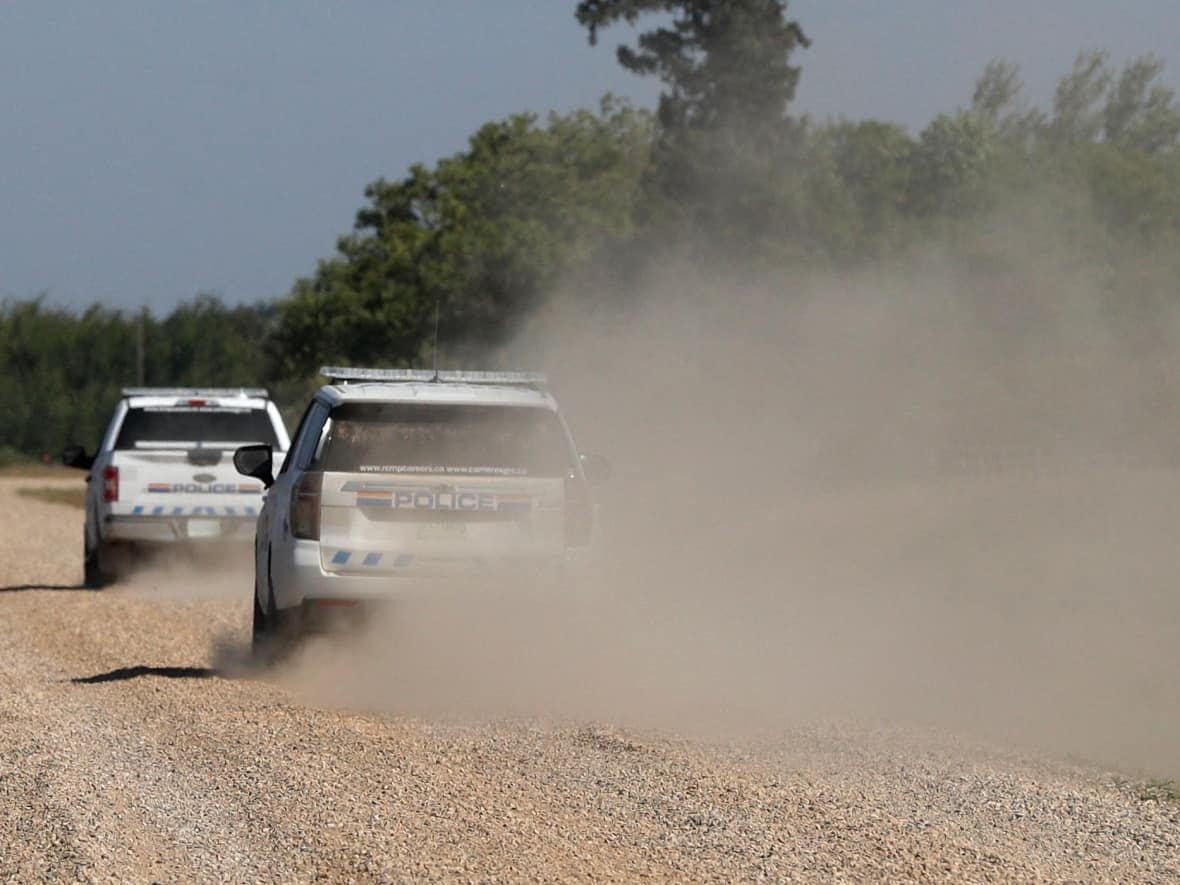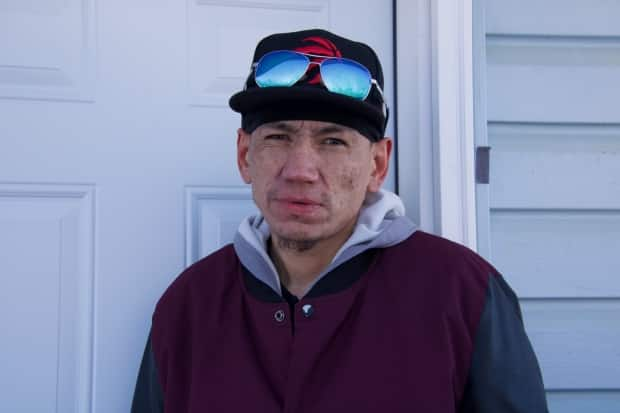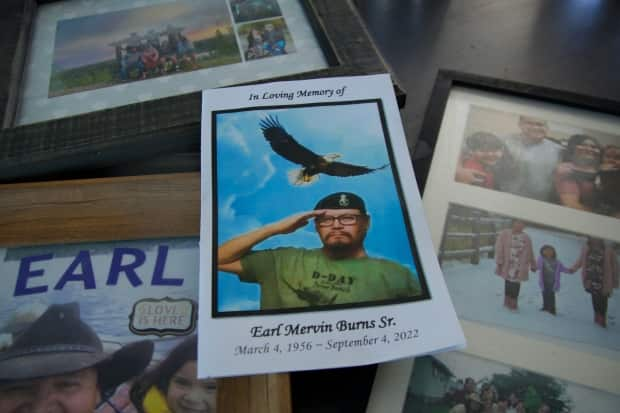Survivors of James Smith Cree Nation stabbing rampage try to move past their 'never-ending pain'

WARNING: This story contains distressing details.
Keenan Head was sleeping when death came to his doorstep.
It was sometime between 5:30 and 6 a.m. on Sept. 4, 2022. His girlfriend heard the crunch of tires on gravel in the driveway, followed by heavy steps up the small wooden porch to the door of her home.
She shook him awake and he stumbled toward the door, where he saw his childhood friend, Myles Sanderson — who at the time was in the midst of a deadly armed rampage through the James Smith Cree Nation, about 200 km northeast of Saskatoon.
"He was just saying, 'F-you, f-you' all the time," Head said.
"I thought he was punching me … I thought he was giving me some bro shots."
But they were knife wounds.
"I was stabbed 20 times," Head said.
"First, the paramedics counted 18, and I snapped out of it and they counted 20. Twenty stab wounds and a punctured lung."

Head's girlfriend was also stabbed four times.
Sanderson is believed to have killed 11 people — including his brother Damien — and injured 18 others in the small Cree nation and the nearby town of Weldon, Sask. It was the deadliest stabbing spree in Canadian history.
Sanderson was arrested and died in police custody after an intense four-day search.
Half a year after the massacre, Head and other victims who spoke to CBC News say they continue to struggle and need more support as they search for answers behind layers of trauma.
They'll have to wait until early 2024 for two inquests to begin — one looking into the massacre, the other into Sanderson's death — to allow the RCMP time to conclude its investigation.
'Like a nightmare'
Swaying back and forth on a bright cold day in James Smith, Head, 33, stood outside his girlfriend's home where the attack took place. He said he still can't make sense of those violent hours that forever changed his life.
"It kind of felt like a nightmare," Head said. "He was my best bro, man ..."
He's homeless and struggling to cope with the aftermath of his brush with death. Head said times are so tough from him, he sometimes wishes police would come and put him behind bars.
"I just want to go back to f--king jail," Head said.
"Everything's just hitting me."

Indigenous Services Canada gave James Smith Cree Nation $1.2 million to repair and replace houses damaged during the mass stabbing. That doesn't help Head, since he didn't have a house to begin with.
So he couch surfs and stays with his girlfriend from time to time. He said their relationship has faced challenges since he was attacked and he's experienced emotional breakdowns.
"It just comes and goes, like you just can't even stop that," Head said.
"I need some help … I've been through a lot of stuff in my life, man, you know? This one here just tops it off."
'Bleeding and bleeding'
The day before the massacre, Head was hanging out with Sanderson. They shared a few joints before Head was dropped off at his girlfriend's house for the night.
Head said they were "crazy buddies" and he never expected Sanderson to come after him.
"I thought he was drunk, but I don't know what the hell he was on," Head said.
Head said that after he was stabbed, he went door-to-door in the James Smith village looking for help. He said no one answered the door at the first house and the residents in the second told him to leave them alone.
"I was standing on the steps there bleeding and bleeding," Head recalls.

Head said he spent about two weeks in the hospital. The scars are still visible on his neck.
For a while, he said, he was drinking a bottle of liquor each day to cope. He said he checked himself into detox and tried treatment, but it didn't help.
He said he's afraid of losing his mind.
"I just don't want to go back to my lifestyle, get into trouble and stuff. I want to change my ways."
'Dad tried to kill me'
Vanessa Burns is also trying to get help — for herself and the five children she had with Sanderson. She has a therapist, has attended a suicide prevention workshop and a traditional healing session. She even tried yoga. Nothing has worked.
"It's just like a never-ending pain," Burns said. "It's just there every day."
Burns woke up on Sept. 4, 2022 to multiple missed calls and a text from her 13-year-old son Dallon: "Dad tried to kill me."
Her son was staying with her parents in James Smith. Dallon told her Sanderson stabbed her mother Joyce and dad Earl Burns Sr.
"It was pretty shocking ... I was pretty scared too," said Burns, who added she was beaten by Sanderson two days before the stabbing spree.

Burns said she didn't know if Sanderson was going to show up at her house in Saskatoon — the home she moved into to be with Sanderson after giving up a home in James Smith — so she assembled the kids and fled.
Dallon, she said, loaded a gun and kept watch over his grandparents' place in case his dad returned.
This wasn't the first time Sanderson had attacked her parents. He was convicted of repeatedly stabbing them with a knife in 2015 and was sentenced to two years less a day.
But this time, her father died.
"I feel guilty. I feel like I shouldn't have, like I wish I never met him," Burns said.
"I feel like he just, he won. Like, he destroyed my family."
WATCH | Survivors try to move on with their lives after stabbing rampage:
When she returned to her Saskatoon home later that week, Burns said, she found a condom on her door and her mail scattered.
She said she believes it was a sign from Sanderson.
"Nobody goes to my house but him," she said. "He knows where I live."
Burns is now staying at her mother's house. They're missing the loving grandpa they fondly remember as funny and always willing to help out, always keen to take his grandchildren out for quad rides.
Burns said she believes Sanderson came to her parents home to kill her dad because he tried to protect her from his constant abuse.

"He probably would have killed the kids too, if my dad didn't do anything," she said.
'Asleep for 10 years'
Burns met Sanderson at her parents' house 16 years ago on Christmas Day.
She said he would be nice to her at first before suddenly turning on her — accusing her of cheating on him, gaslighting her, make her feel she was going crazy.
The abuse started early in the relationship, she said. Every time she tried to leave him, she added, he always found her no matter where she went.
"You can get to that stage where you don't care about yourself and you just get comfortable, and you just let somebody just abuse you," Burns said.
"I was asleep for 10 years letting somebody control me, manipulate me."
Burns said Sanderson also hurt his kids by pulling their ears and slapping them hard.
But Burns said she never wanted to keep their children away from their dad, even as his family made her feel guilty for staying away from him and getting the police involved.
"I just forgive too easily," Burns said. "That's my problem, I think."
Burns will soon be working with the RCMP to help investigators understand Sanderson's mind.
She blames his behaviour on the hard drugs he did behind her back — mostly cocaine, some crystal meth.
Burns said Sanderson's grandfather, a residential school survivor, was cruel to him and would beat him for minor mistakes.
"I think that had a lot to do with his anger," she said.
Now, she said, she wonders if she ever really knew him.
"Was that really him?" Burns said. "Was he just faking it the whole time?"


